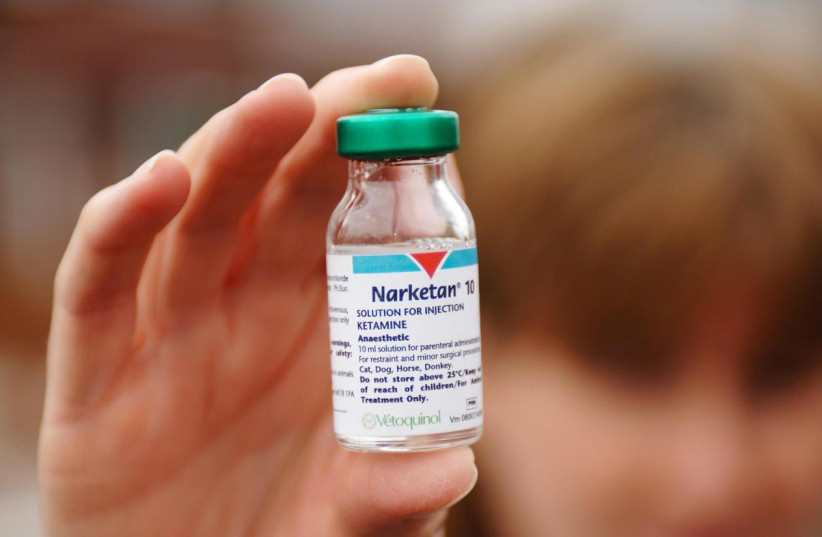For years, ketamine served as a potent anesthetic, and in recent decades, it gained popularity as a recreational drug. However, a recent breakthrough has transformed its role: ketamine is emerging as a potent tool for treating severe, treatment-resistant depression that conventional medications fail to address.
A recent extensive study published in the prestigious New England Journal of Medicine revealed that ketamine treatment provides comparable benefits to those suffering from unresponsive depression, matching the effectiveness of the most advanced treatment available today—electroconvulsive therapy—while offering fewer side effects. Ketamine and its derivatives are critical in confronting an epidemic that claims numerous lives in Israel annually and over a million worldwide.
This groundbreaking study, the most comprehensive and significant to date, unveiled that ketamine treatment is on par with the most potent existing therapy for resistant depression. Investigating the potential of this substance—originally an anesthetic, then a street drug, and recently reevaluated as a remedy for non-responsive depression—against electroconvulsive therapy, the current leading acute depression treatment.
What the research showed
The research demonstrated that ketamine matches the effectiveness of electric shocks. A closer examination of the study highlights that ketamine treatment often outperforms electric shocks, particularly concerning side effects.
Between 15-30 percent of the global population is expected to encounter significant depression during their lifetimes. In Israel alone, the number reaches two to three million individuals. Though various classes of antidepressants developed since the 1950s can help many patients, the problem arises when about 20% of patients fail to respond or only show partial improvement to these conventional medications. Certain patients unresponsive to drug-based therapy find relief in targeted psychotherapeutic approaches like CBT and IPT, which, while valuable, also present limitations. This translates to prolonged depression, immense suffering for patients and their families, and substantial disruption to the daily lives of hundreds of thousands of Israelis. Moreover, depression exacts a lethal toll, with approximately a million people globally succumbing to suicide each year due to its grasp.
Presently, the most effective treatment for resistant depression entails electroconvulsive therapy administered under general anesthesia. Although psychiatrists highly value this approach's efficacy, it bears three significant drawbacks:
- It carries a societal stigma, deterring many patients from pursuing it.
- Side effects such as memory impairment, although typically temporary, pose challenges.
- Given that resistant depression is a chronic condition, the complexities of repeatedly administering electric shock treatments render it inadequate to address the widespread affliction.
For decades, following the advent of the initial and second-generation antidepressants, psychiatry grappled with treatment-resistant depression. The search for alternatives propelled the development of innovative techniques like electromagnetic stimulation therapy (TMS). However, these methods tend to be cost-prohibitive and unlikely to serve as the mass solution needed. As such, efforts intensified in exploring innovative drug treatments and overcoming historical stigma, leading to reevaluating familiar substances—including those once deemed street drugs—and the consequent neglected research on their therapeutic potential.

Recent findings
In the past decade, ketamine's effectiveness in depression treatment garnered attention. While the substance faced disqualification due to its potential for inducing psychosis and psychedelic experiences—similar to the "trip" and immediate highs that popularized it as a street drug—recent findings unveiled its utility in cases where conventional treatments falter. Notably recognized by the medical community since the mid-20th century as an anesthetic, ketamine continues to find use in short-term child anesthesia and veterinary treatments. Despite early skepticism due to the negative reputation of such drugs, accumulating evidence highlighted ketamine's potential to address treatment-resistant depression. Contrary to initial fears, the risk of addiction and psychosis appears less dire.
The utilization of ketamine gained acceptance and earned a place in the official psychiatric toolkit of numerous countries. To provide a comprehensive picture, a recent study enrolled nearly 400 patients with resistant depression across five US medical centers. This extensive study represents the most substantial clinical comparison undertaken to date. The researchers deliberately targeted the most complex cases, with 40% of participants having previously explored other avenues.
The research team categorized participants into two groups: one receiving electric shock treatment and the other undergoing ketamine treatment. After three weeks of interventions, 55% of ketamine-treated participants reported significant alleviation of depression symptoms, surpassing the 41% improvement seen in participants subjected to electric shock therapy. Follow-up assessments conducted six months later demonstrated near-identical quality-of-life indicators for both groups.
One drawback of ketamine treatment is its requirement for injection, hindering its application and impeding its effectiveness for this widespread issue. Consequently, efforts are underway to develop more user-friendly administration methods for ketamine or its analogs, while preserving their efficacy. An effective approach involves distilling ketamine to produce esketamine, a molecule suitable for administration via a nasal spray. Absorbed through nasal blood capillaries, this innovation eliminates the need for intravenous injection. Esketamine's efficacy against depression has been proven, and its user-friendly administration led to approval by the American FDA in 2019, designating it a "breakthrough drug" for resistant depression treatment. It has also gained approval from the European Medicines Agency (EMA) and the Israeli Ministry of Health, entering Israel's medicinal repertoire since 2020.
An added advantage of ketamine and esketamine treatment lies in the rapid response often experienced by those grappling with resistant depression. Presently, asketamine treatment occurs in specialized clinics, requiring patients to remain under observation for two hours post-treatment. Although the process remains intricate, the effort proves worthwhile for individuals enduring long-term major depression, as evidenced by notable improvement under the novel treatments.
At times, these treatments work like miracles. Substances such as ketamine and esketamine signify a significant leap forward in depression management. The "For Life" association, dedicated to suicide prevention, sees these drugs as promising instruments in tackling the ongoing and deadly epidemic of suicide. The author, Prof. Hagai Harmesh, an esteemed psychiatrist and executive board member of the "For Life" association, emphasizes the high potential of these drugs in the fight against this tragic scourge.
